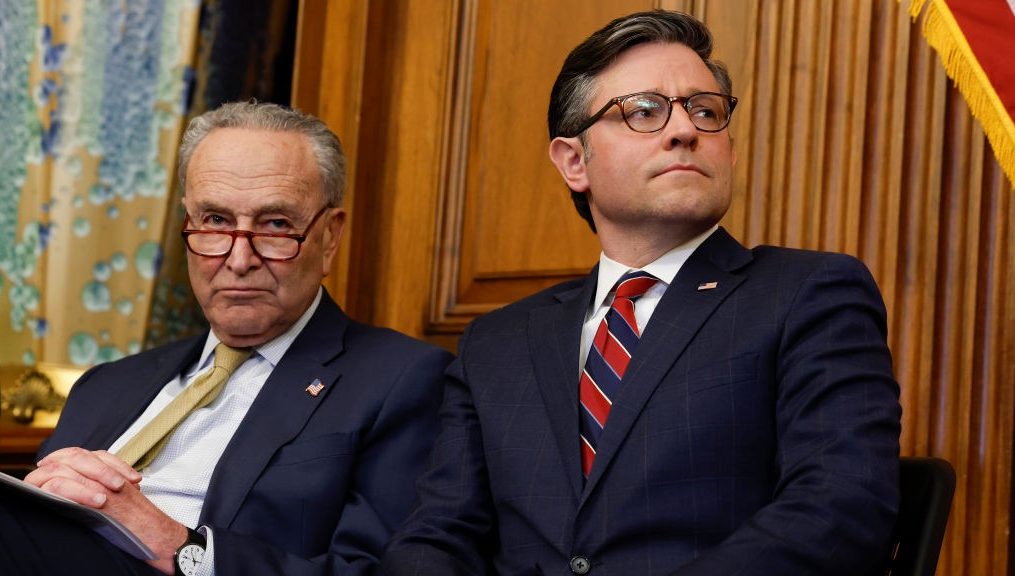Will 2024 yield more congressional bipartisanship or be a repeat of 2023?
House and Senate leaders on Sunday announced a topline deal to fund the government in 2024 in what has become a rare instance of bipartisan agreement on Capitol Hill. The deal would agree to set the total amount of spending this year at $1.59 trillion and is the first step in avoiding a looming government shutdown later this month. This would include $886 billion for military armaments and $704 million for non-defense spending.
While this bill reduces the chances of a shutdown, it still faces several hurdles — namely, getting it through a divided Congress and actually getting it passed before the Jan. 19 deadline — but the agreement marks the culmination of weeks of negotiations. The deal notably represents the first major bipartisan package between Democrats and Republicans during the tenure of House Speaker Mike Johnson (R-La.). The bill was helmed by Johnson in collaboration with House Minority Leader Hakeem Jeffries (D-N.Y.) and Senate Majority Leader Chuck Schumer (D-N.Y.).
But given that this agreement is just the first step in avoiding a shutdown, does this mean that there is more bipartisan togetherness on the horizon? Or is this deal to fund the government simply an anomaly?
Sign up for The Week’s Free Newsletters
From our morning news briefing to a weekly Good News Newsletter, get the best of The Week delivered directly to your inbox.
From our morning news briefing to a weekly Good News Newsletter, get the best of The Week delivered directly to your inbox.
Uncertainty remains
While this deal may be a good sign for bipartisanship, it “remains uncertain how that effort will play out even though Schumer and Johnson have a deal on funding levels,” Manu Raju and Haley Fox wrote for CNN. Notable opposition to the deal came from the most conservative members of the House, led by the far-right contingent of the House Freedom Caucus.
Despite Johnson being aligned ideologically with the Freedom Caucus, the group blasted the bipartisan deal as a “total failure” and called for additional spending cuts. Many of Johnson’s critics in his own party “want the legislative victories that flow from electoral successes in the absence of those electoral successes,” Noah Rothman wrote for National Review. If Johnson cannot meet the Freedom Caucus expectations, then “it’s possible that those expectations are the problem,” Rothman opined.
The opposition from the Freedom Caucus, “which is a loud and strong contingent in the House GOP conference, makes the goal of averting a government shutdown much more of a headache,” Raju and Fox added.
Numerous policy riders still need to be worked out before a final appropriations bill can be passed. But “previous GOP rebellions in the spending fight have seen conservative lawmakers intentionally tank their own party’s procedural votes,” Elizabeth Elkind wrote for Fox News. This has “effectively [delayed] government funding bills from getting to the floor,” she added, and it remains to be seen whether or not this will be remedied in 2024. Given the GOP’s small majority, it seems inevitable that “any final appropriations bills will need Democratic support to pass the House,” Elkind said.
Republicans hoping for a ‘broad desire to govern’
Many Republicans “hope the new year brings with it a broad desire to govern and, in turn, prove to the public that they deserve another term in control of the House,” Marianna Sotomayor wrote for The Washington Post. However, the ability of Republicans to accomplish this “is already primed to plague the conference as it starts the year with just three votes to spare to pass anything through its fragile majority,” Sotomayor added.
Some Republicans appeared angry at the prospect of another showdown between the center and far-right wings of the party. “How much can you just say no and remain to be credible? If you say ‘no, no, no’ and everything’s a failure and you’re against everything, you lose credibility,” Rep. Greg Murphy (R-N.C.) told Fox Business, adding that we “have to let our leaders lead.”
The current proposal “is really not going to move the needle,” Murphy opined. The congressman added that the sides needed to come together to “reform mandatory spending: social security, Medicare, Medicaid. Those are the things that are going to reform spending.” Noting that some in the media have criticized Republicans for a lack of governance, Murphy said this was due to the type of behavior being displayed by the Freedom Caucus “where you say ‘no, no, no’ to everything,” calling it “nonsense.”
Despite GOP infighting, Schumer and Jeffries appeared to remain confident in the continued potential for bipartisanship. The Democrats said in a joint statement that “both sides will need to work together in a bipartisan way and avoid a costly and disruptive shutdown.”
